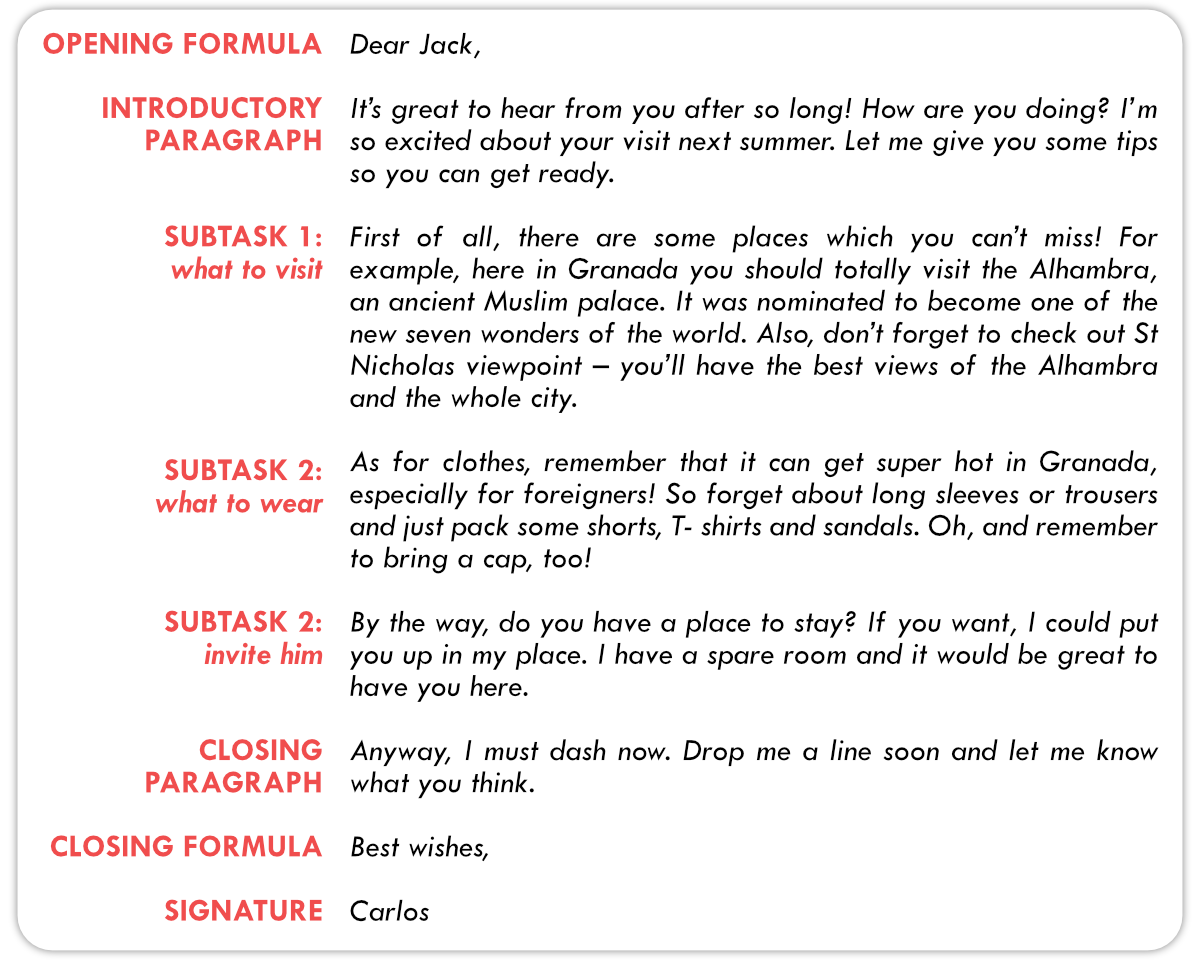How to Write an Informal Letter/Email for FCE Writing
An email is an example of interactive writing, which means that we are writing to someone rather than just for someone to read.
- Purpose of an informal email: The purpose of an informal email will depend on each task. Some tasks ask you to provide your friend with some important information, while others might ask you to ask for some advice. It is common for a friend or relative to ask you something about the place where you live while saying that they will be visiting soon.
- Language: Given that we are writing to a friend or close relative, our language will be relaxed and friendly. We could call it informal language if you want. So we will be making use of contracted forms, common phrasal verbs, colloquial expressions, and even flexible punctuation (E.g.: using em dashes «–»)
- Structure: One of the cool things about emails is that they always follow the same structure. In general terms, we always need an opening and a closing formula; an introductory and closing paragraph; and the body, which will consist of as many paragraphs as ideas you are asked to discuss.
- Common topics: Many informal emails to friends and relatives deal with giving advice on a certain subject, such as visiting your hometown, keeping fit, advice on which cities to visit in your country, organizing a party for a mutual friend, etc. Sometimes, these topics may appear in combination.
- The number of words: like all FCE Writing tasks, informal emails should be written in 140 – 190 words.
FCE Writing Informal Email Example
Now that we are familiar with the characteristics of an informal email for First (FCE) Writing, let’s take a look at an example of an informal email at B2 level, both at the task and at a sample answer.
Instructions of an informal email

It is extremely important to pay careful attention to these instructions because it is here where we have to find out what to talk about in our email. For example, in this case, we have the following:
- The addressee: an English friend of yours
- The context: is visiting your city next summer
- The main ideas/paragraphs: tell him about the places he should visit / and the clothes / invite him to stay with you
And that’s how you know what you have to write about.
Sample answer
Now that we have a sample task, let’s take a look at a sample FCE answer to the task above. Pay attention not only to the language but also to the clear structure marked in red.

If we take a quick look at the email above, we can see the following features:
6 Strategies for Achieving and Maintaining a B2 to C2 Level of English
- The email layout is extremely clear. This is easily achieved by using opening and closing formulas and paragraphs, a signature, and allowing some space between all the semi-independent paragraphs.
- Each paragraph has a clear purpose, which in this case is marked in red.
- The opening and closing formulas are used to say «hi» and «goodbye» in a polite way.
- The introductory paragraph is typically used to react to news (It’s great to hear from you… / I’m so excited about...) and to introduce the topic of our email.
- The main body deals with each of the sub-tasks, which in this case are: what to visit, what to wear and invite him.
- In the closing paragraph, we start saying goodbye and we can ask for a reply to our email.
- The language is informal:
- Contractions: It’s great, I’m, you’ll have, etc.
- Common phrasal verbs: put you up, check out.
- Colloquial language: How are you doing?, you should totally, you can’t miss, drop me a line, etc.
- Writing as we think: Oh, By the way, Anyway,
- Flexible punctuation: …viewpoint – you’ll have the best…
This is a good example of an informal email for FCE Writing. By the way, you must bear in mind that it has been written to simulate a strong B2 level, without necessarily reaching C1.
Using Phrasal Verbs Correctly in Advanced and Academic Writing.
Useful Expressions for an Informal Email for FCE Writing
So if you want to learn how to write an informal email for FCE, you need to have a set of expressions ready to use. Some of these useful expressions are the following:
- Greetings:
- Dear Sarah,
- Hello Sara,
- Hi Sara,
- Introductory paragraph:
- How’s it going?
- How are you doing?
- How are things?
- How are things going?
- It’s great to hear from you!
- Long time, no see!
- Sorry I haven’t written for ages, but
- I’m really sorry it’s taken me so long to get back to you.
- Reacting to the good news:
- I’m glad to hear that
- I’m so happy that
- Great news about your
- I’m very happy to hear about
- It’s so great that
- Reacting to bad news:
- I’m so sorry to hear about
- Sorry to read about
- I can’t tell you how sad I am that
- I’m extremely sorry to hear about
- It’s just awful to hear that
- Introducing paragraphs:
- Oh, by the way,
- Hey, did you hear about…?
- One more thing,
- As for
- By the way, tell me about
- Ending the email or letter:
- Well, I gotta go now.
- Anyway, I should get going.
- I’ve got to leave you now.
- I’d better get going.
- Well, it’s time to go
- Make sure you write soon
- Don’t forget to drop me a line soon.
- Look after yourself.
- Take care of yourself.
- Closing the email or letter:
- All my love,
- Love,
- Lots of love,
- All the best,
- Take care,
- Best wishes,
- Best,
- Regards,
- Kind regards,
The 90 Essential Similies For Achieving a B2 to C2 Level of English
The 100 Metaphoric Expressions Essential For Achieving a B2 to C2 Level of English.
Simplifying Linking Words for Successful Writing. A comprehensive list and explanation
"Substantial Reading" and 8 Self-Study Tips for Achieving a Proficient Level of English
ADVANCED ENGLISH: Tips for Becoming a Confident Communicator.
Essential Tips for Memorizing Advanced Vocabulary.
Enhancing Your Vocabulary with Prefixes and Suffixes.
The 100 Most Important Words for Achieving a B2 to C2 Level of English.












Comments
Post a Comment